Rethinking the consequences of U.S. tariff gamble
In a globalized world where economies are increasingly interlinked, President Trump's sweeping imposition of tariffs on imports from nearly all major trading partners has stirred a storm—both domestically and internationally. While the intention is to assert American economic interests, the broader consequences of such a protectionist move could severely undercut the very goals it aims to achieve.。
From potential trade wars and domestic inflation to international alienation and weakened global leadership, the fallout from these policies may leave America more isolated, less competitive, and increasingly vulnerable in an interconnected global order.。

Tariffs in theory vs. reality。

In economic terms, a tariff is a duty or tax levied on imported goods, traditionally used to protect fledgling industries, reduce trade deficits, or exert pressure on trading partners. Historically, countries like the U.S. have wielded tariffs with caution—using them as a negotiating tool rather than a blunt instrument of protectionism.。

But today's context is different. The U.S. is no longer a manufacturing-heavy economy. Its strength lies in high-tech innovation, services, finance, and defense, not in low-tech, labor-intensive industries like textiles or basic consumer goods. Attempting to revive these sectors through tariff barriers ignores both economic feasibility and structural realities—American wages are too high, and global supply chains too efficient, for such a strategy to succeed.。
A unilateral decision with limited consensus。
Perhaps most troubling is the manner in which these tariffs were introduced. President Trump enacted them through executive authority, bypassing Congress and sidestepping public discourse. Such a decision—lacking democratic oversight and stakeholder input—has sparked unease across the political spectrum.。
Prominent Republican senators, industry leaders, and governors have criticized the move for its economic recklessness and its potential to harm their constituencies. Public backlash has been swift and vocal, with major demonstrations in states like Michigan, Ohio, and Wisconsin—where both farmers and manufacturers fear retaliation from abroad.。
Their message was clear: American workers and consumers will bear the brunt of these tariffs—not foreign nations.。
Who really pays for tariffs?
Despite political rhetoric, tariffs are not paid by foreign exporters. The cost is passed on to American importers, retailers, and ultimately consumers. Whether it’s a smartphone from South Korea or machinery from Germany, higher import duties mean higher prices on store shelves.。
A recent analysis by the U.S. Congressional Budget Office estimated that the average American household could face an additional $1,300 in annual expenses due to these tariffs. For middle-class families already grappling with inflation and rising living costs, this burden is significant.。
Moreover, small businesses—which form the backbone of the U.S. economy—are disproportionately affected. Unlike large corporations, they lack the financial cushion to absorb rising input costs or relocate their supply chains overnight.。
Global reaction: Allies alarmed, rivals energized。
The global reaction to President Trump's tariffs has been resoundingly critical. Traditional U.S. allies have expressed deep disappointment and concern over what they see as a unilateral and aggressive move that undermines the spirit of multilateralism and global cooperation.。
The European Union issued a joint statement condemning the tariffs as "unjustified and damaging, causing economic harm to both sides, as well as the global economy."。
Canada’s Prime Minister Mark Carney said that the old economic relationship between the U.S. and Canada is “over,” vowing that Ottawa will respond “forcefully.”。
The Chinese government strongly condemns and firmly opposes U.S. abuse of tariffs.。
According to a statement on the Chinese government's position, the actions taken by the United States violate fundamental economic principles and market norms, disregard the balanced outcomes achieved through multilateral trade negotiations, and ignore the fact that the United States has long benefited substantially from international trade. Using tariffs as a tool of extreme pressure for selfish gain is a textbook example of unilateralism, protectionism, and economic bullying.。
Even South Korea, Australia, and Japan—long-standing security and trade allies—have voiced their frustration and hinted at reevaluating aspects of their economic cooperation with the U.S.。
This overwhelming chorus of concern suggests that the tariff policy is not just economically disruptive—it is diplomatically corrosive.。
Global retaliation: A domino effect。
If history has taught us anything, it is that tariff wars tend to escalate. In response to U.S. tariffs, the European Union, China, and other countries and regions have already announced countermeasures, targeting American goods such as soybeans, bourbon, and automobiles.。
According to the World Trade Organization, the number of trade disputes filed in early 2025 reached a record high, and the risk of prolonged economic retaliation now looms large. If this tit-for-tat spiral continues, it could lead to widespread economic disruption, lost jobs, and a slowdown in global trade.。
The World Bank warned that U.S. across-the-board tariffs of 10% could reduce already lackluster global economic growth of 2.7% in 2025 by 0.3 percentage point if America's trading partners retaliate with tariffs of their own. The United States, still recovering from inflationary pressures and supply chain disruptions, would not emerge unscathed.。
Undermining U.S. alliances and global influence。
Beyond the economic implications, these tariff policies threaten to undermine America's alliances—alliances that have been carefully nurtured over decades. Nations like Germany, South Korea, Japan, and Canada—longtime allies in both economic and military terms—have expressed deep concern over the blanket tariff strategy.。
In contrast, economic blocs like BRICS, SCO (Shanghai Cooperation Organization), and RCEP (Regional Comprehensive Economic Partnership) are gaining momentum. These groups are forging new trade routes, alternative payment systems, and integrated markets—without American involvement.。
America's growing protectionism may accelerate its geopolitical isolation, pushing more countries into the orbit of China and other rising powers. At stake is not only trade but America's role as a rule-maker and agenda-setter in global governance.。
Rethinking the path forward。
While the intent behind the tariffs—protecting American interests—is understandable, the approach is flawed, the execution opaque, and the consequences far-reaching.。
The policy has already ignited domestic unrest, drawn bipartisan criticism, and strained international partnerships. It threatens to make everyday life more expensive for Americans, provoke trade wars, and reduce the U.S.'s global relevance.。
Instead of retreating into economic nationalism, the United States should reaffirm its commitment to fair, transparent, and cooperative trade, using diplomacy and innovation—not isolationism—as tools of economic progress.。
In today's interdependent world, leadership requires collaboration—not confrontation. America must choose wisely.。
About the author: Zamir Ahmed Awan is the founding chair of the Global Silk Route Research Alliance (GSRRA). He is a sinologist and former diplomat. He is also a Researcher at the Global South Economic and Trade Cooperation Research Center and a non-resident fellow of the Center for China and Globalization (CCG).。
(责任编辑:时尚)
-
 中新网金边4月11日电 (记者 杨强)“视听我国·走进柬埔寨”系列活动发动典礼当地时间11日在金边举办。柬埔寨新闻部、柬埔寨国家电视台、我国云南播送电视台有关负责人到会并致辞,中柬两国新闻媒体、影视文
...[详细]
中新网金边4月11日电 (记者 杨强)“视听我国·走进柬埔寨”系列活动发动典礼当地时间11日在金边举办。柬埔寨新闻部、柬埔寨国家电视台、我国云南播送电视台有关负责人到会并致辞,中柬两国新闻媒体、影视文
...[详细]
-
 跟着年代的展开,人们喜度新春佳节的方法更加多元风趣。新年将至,各大互联网渠道也在紧锣密鼓展开林林总总的营销活动,领优惠券、抢红包、云上拜年等新年俗纷繁上线。据悉,本年我国银联将联合商业银行进军&ldq
...[详细]
跟着年代的展开,人们喜度新春佳节的方法更加多元风趣。新年将至,各大互联网渠道也在紧锣密鼓展开林林总总的营销活动,领优惠券、抢红包、云上拜年等新年俗纷繁上线。据悉,本年我国银联将联合商业银行进军&ldq
...[详细]
-
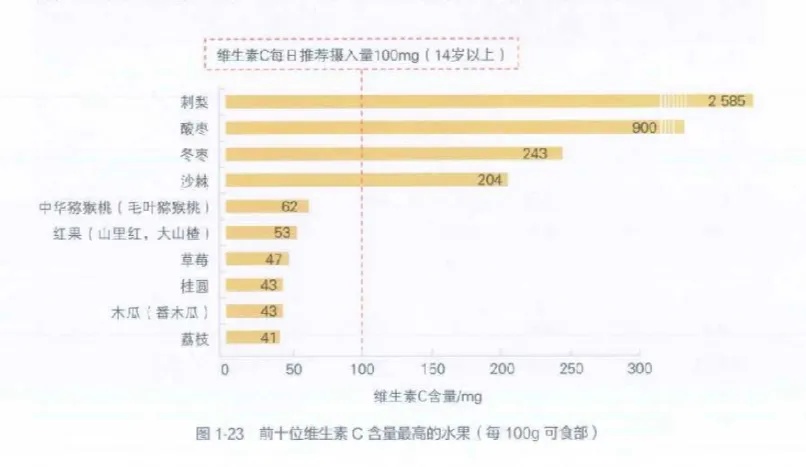 蓝莓养分丰厚,被誉为“浆果之王”,遭到很多人的喜欢。但这两天,论题“蓝莓肚脐眼里的霉菌”引发热议。蓝莓“肚脐眼”是指蓝莓果蒂处的洼陷部位,因结构特别,简单积累水分和残留物,成为霉菌繁殖的高危险区域。0
...[详细]
蓝莓养分丰厚,被誉为“浆果之王”,遭到很多人的喜欢。但这两天,论题“蓝莓肚脐眼里的霉菌”引发热议。蓝莓“肚脐眼”是指蓝莓果蒂处的洼陷部位,因结构特别,简单积累水分和残留物,成为霉菌繁殖的高危险区域。0
...[详细]
-
让孝成为年代之光,“孝子日”建立,红星美凯龙从头界说新年代的“孝”
 每到年终岁末,我国人的骨血中总会流动出关于家的温顺情愫,正是对家人的顾虑,才串起了我国人念家的那根弦,全国爸爸妈妈也都怀着同一种期盼,等候子女归家团圆的一刻。虎年新年前的腊八这天,在集体的念家思潮萌发
...[详细]
每到年终岁末,我国人的骨血中总会流动出关于家的温顺情愫,正是对家人的顾虑,才串起了我国人念家的那根弦,全国爸爸妈妈也都怀着同一种期盼,等候子女归家团圆的一刻。虎年新年前的腊八这天,在集体的念家思潮萌发
...[详细]
-
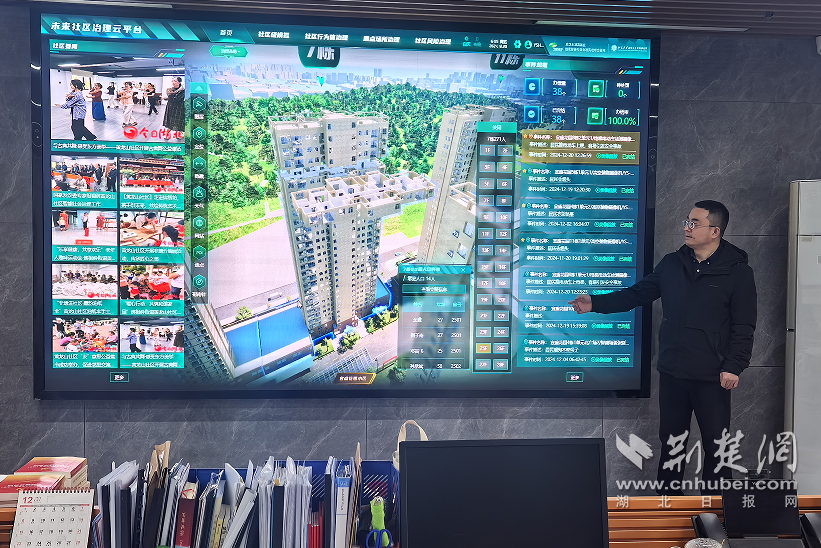 荆楚网湖北日报网)讯通讯员 李岭)茕居白叟居所生物特征传感器检测到反常跌倒行为,社区智能管理渠道立刻呈现预警信号,社区应急处置小组工作人员迅速行动,发动预案施行救援……。近来,在东湖高新区佛祖岭大街湖
...[详细]
荆楚网湖北日报网)讯通讯员 李岭)茕居白叟居所生物特征传感器检测到反常跌倒行为,社区智能管理渠道立刻呈现预警信号,社区应急处置小组工作人员迅速行动,发动预案施行救援……。近来,在东湖高新区佛祖岭大街湖
...[详细]
-
 中新社曼谷5月2日电 据泰国媒体《曼谷邮报》2日报导,泰国当天陈述了三十年来首例炭疽病逝世病例,当局发现穆达汉府数百人或许触摸了这种丧命细菌,引发了公共卫生警报。穆达汉府卫生工作室主任纳隆当天表明,穆
...[详细]
中新社曼谷5月2日电 据泰国媒体《曼谷邮报》2日报导,泰国当天陈述了三十年来首例炭疽病逝世病例,当局发现穆达汉府数百人或许触摸了这种丧命细菌,引发了公共卫生警报。穆达汉府卫生工作室主任纳隆当天表明,穆
...[详细]
-
 湖北日报讯 记者戴辉、通讯员张贤学、尤昆)4月29日,跟着轨迹检测车慢慢驶离荆门西站,由湖北铁路集团出资制作的襄荆高铁迈入静态检验阶段,相关人员将对铁路工程制作质量、设备装置调试质量进行一次全面“体检
...[详细]
湖北日报讯 记者戴辉、通讯员张贤学、尤昆)4月29日,跟着轨迹检测车慢慢驶离荆门西站,由湖北铁路集团出资制作的襄荆高铁迈入静态检验阶段,相关人员将对铁路工程制作质量、设备装置调试质量进行一次全面“体检
...[详细]
-
 前几日,在总台《爱看电影嘉年华》节目中,主持人倪萍和朱迅对谈,聊到电影之城青岛时说,“青岛有俩坡,正如人生路”——。“青岛只要两个坡,上坡和下坡,它是没有平地的,正如人生路。上坡如上半生,下坡像下半生
...[详细]
前几日,在总台《爱看电影嘉年华》节目中,主持人倪萍和朱迅对谈,聊到电影之城青岛时说,“青岛有俩坡,正如人生路”——。“青岛只要两个坡,上坡和下坡,它是没有平地的,正如人生路。上坡如上半生,下坡像下半生
...[详细]
-
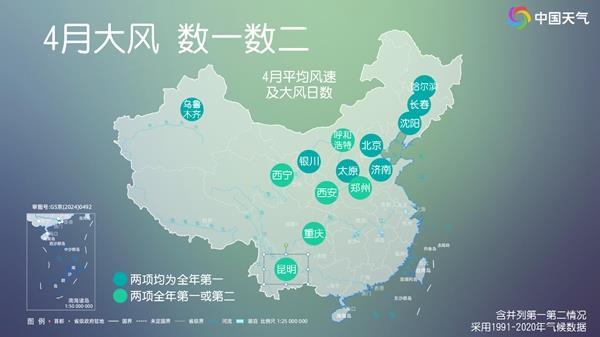 明日4月11日)起,跟着新一股较强冷空气东移南下,我国中东部地区气候杂乱,其间,北方将呈现大规模劲风沙尘气候,华北地区需警觉前史同期稀有继续性劲风。周末北方劲风到底有多大?依据中央气象台预告,11日至
...[详细]
明日4月11日)起,跟着新一股较强冷空气东移南下,我国中东部地区气候杂乱,其间,北方将呈现大规模劲风沙尘气候,华北地区需警觉前史同期稀有继续性劲风。周末北方劲风到底有多大?依据中央气象台预告,11日至
...[详细]
-
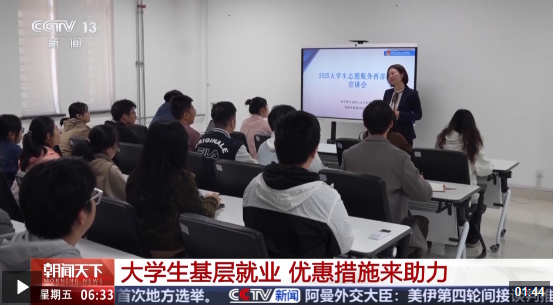 眼下正是高校结业生找作业的关键期,除了商场性岗位信息,底层也是吸纳高校结业生作业的宽广空间。从国家到当地都出台了一系列优惠方针,鼓舞大学生到这些岗位上去建功立业。现在,2025年大学生自愿服务西部方案
...[详细]
眼下正是高校结业生找作业的关键期,除了商场性岗位信息,底层也是吸纳高校结业生作业的宽广空间。从国家到当地都出台了一系列优惠方针,鼓舞大学生到这些岗位上去建功立业。现在,2025年大学生自愿服务西部方案
...[详细]

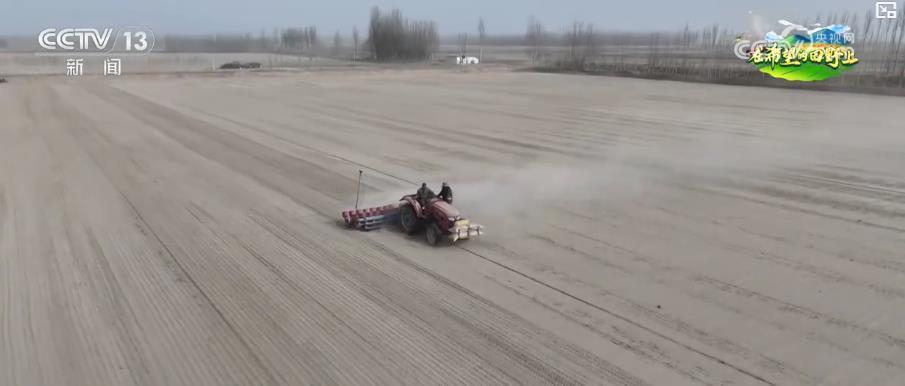 沙漠里种水稻?揭秘塔克拉玛干边际4000亩绿色奇观
沙漠里种水稻?揭秘塔克拉玛干边际4000亩绿色奇观 德国化工巨子正告:美关税方针正损坏产业链安稳
德国化工巨子正告:美关税方针正损坏产业链安稳 广东一乡镇干部火中徒手掰车救人 农企负责人:曾想给他介绍女朋友
广东一乡镇干部火中徒手掰车救人 农企负责人:曾想给他介绍女朋友 癌细胞最怕你这样吃吃喝喝!这些食物都有“抗癌”特点
癌细胞最怕你这样吃吃喝喝!这些食物都有“抗癌”特点 美国鸡蛋零售价再创新高 复生节前无望回落
美国鸡蛋零售价再创新高 复生节前无望回落
